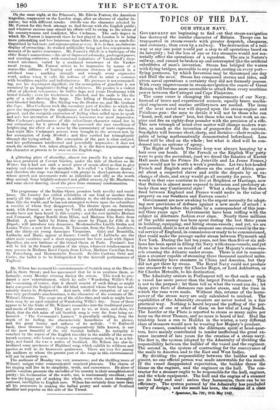Mr. Wilson has resumed his entertainments of Scottish song at
the Music- hall in Store Street; and has announced that he is to continue them, as formerly, every Monday evening during the season. This week he pro- duced a new entertainment, which he calls "Wandering Willie's Wal- let,"—meaning, of course, that it should consist of such things as might have composed the budget of the old blind minstrel whom Scott has so ad- mir' ably drawn in Redyauntlet. And such, with the exception of one or two very pardonable anachronisms, is the character of the contents of Mr. Wilson's libretto. The songs are of the olden time, and such as might have been sung by an aged minstrel of Wandering Willie's day. Some of them appear to be the fruits of Mr. Wilson's researches into the traditional poetry and music of his country. They are new to us, at least, and show, we think, that the rich mine of old Scottish song is very far from being ex- hausted. "The Covenanters Lament" is peculiarly striking, from the depth of its feeling, the characteristic homeliness of its phrase, and the great beauty and sadness of its melody. "0 Bothwell bank, thou bloomest fair," though comparatively little known, is one of the most beautiful of the old Scottish ballads. Its antiquity is vouched by the report of the English traveller in the middle of the seven- teenth century, who heard a woman in a Syrian cottage using it as a lul- laby, and found she was a native of Scotland. Mr. Wilson has also in- troduced some specimens of Highland song, which exhibit its wildness and passion as well as its humorous quaintness. There are very few among his auditors to whom the greater part of the songs in thit_entertainment will not be entirely new.
The audience of Monday was very numerous; and the thrilling tones of Wilson's unique voice communicated unmixed pleasure. The charm of his singing still lies in its simplicity, truth, and earnestness. He alone of public vocalists presents the melodies of his country in their unsophisticated purity; his declamation of the words, too, is uncommonly excellent; and he has the happy art of making the whole, even when most thoroughly national, intelligible to English ears. Wilson has certainly done more than all his precursors in making the ballad poetry and music of Scotland familiar and popular on this side of the Tweed.


























 Previous page
Previous page